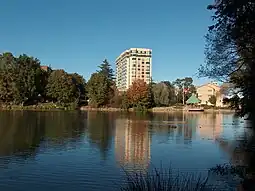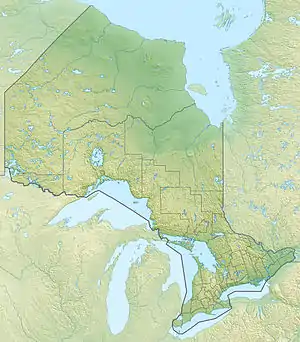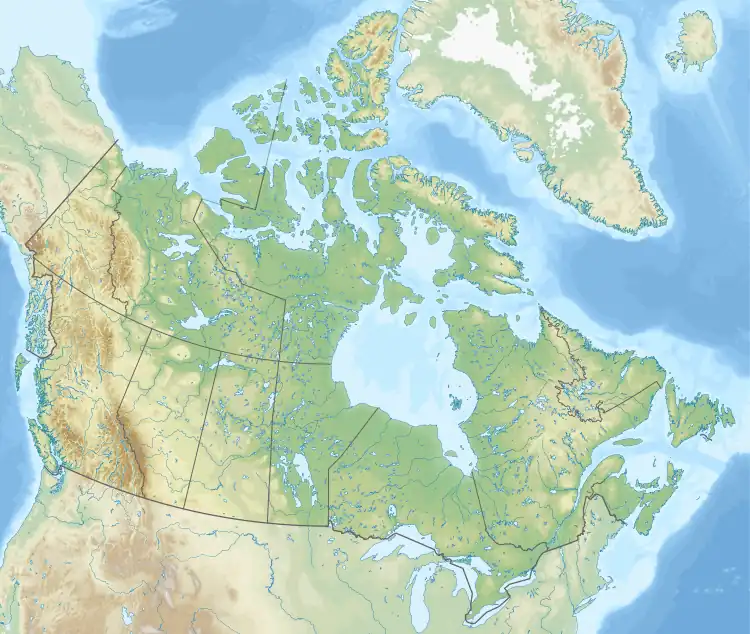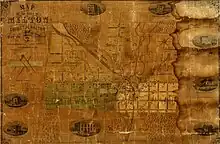| Mill Pond | |
|---|---|
 Mill Pond, Milton, Ontario | |
 Mill Pond Location of Mill Pond in Ontario  Mill Pond Mill Pond (Canada) | |
| Location | Milton, Ontario |
| Coordinates | 43°30′51″N 79°53′11″W / 43.51417°N 79.88639°W |
| Type | reservoir |
| Basin countries | Canada |
Mill Pond[1] is a manmade freshwater reservoir[2] in downtown Milton, Ontario, Canada.[3][4][5]
The pond is located on the main street of downtown Milton, a suburban town north of Lake Ontario in the Regional Municipality of Halton.[4][6][7][8] Halton is the west wing of Greater Toronto Area bordering Niagara escapement to the west.
The pond powered a gristmill[9] for almost a century, within which time a pioneering settlement grew up to be the town of Milton around the pond and the mill.[9]
History
.jpg.webp)
The town and the Mill Pond share the same origin in the history. The 16-mile creek flowing right in the middle of the town was dammed to create the pond to power gristmill by the town’s pioneering entrepreneur and founder Jasper Martin in 1820-1822.[6][10][1]
The original settlement in 1837 with a population of 100 people became a fully incorporated town in 1857.[1] It was named after the English Poet John Milton.[11] The town of Milton grew around the pond and the mill; according to 2016 census to be 110,128 in population.[12]


The current historic old building standing adjacent to the pond is the third mill surviving on the property after two great fires.[1] The first fire in 1855 consumed the stone building that replaced the original frame building.[11] The second fire was just two years after Dr. C.A. Martin, the great-grandson of the mill’s founder, sold the mill to Robin Hood Flour Mills in 1961.[13] The fire consumed the century old grinding mill in a few hours in the morning of February 12, 1963.[1] According to Milton Fire Brigade, they poured 1.5 million gallons of water from the creek, hydrants and from the pond, reducing the water level of the pond by a foot, without being able to save the third building constructed in the property.[14][1] This fire destroyed the original water-wheel that was used to power the flour grinding equipment until 1962. Housed at the back of the building, the wheel was operated by water from the millpond and creek, and drove the assembly of belts and pulleys to operate the entire mill.[1]
1967 Dominion Centennial project
In conjunction with the yearlong Canadian Centennial celebrations held in 1967 to celebrate the 100th anniversary of Canadian Confederation,[15] the town of Milton decided to redesign the Mill Pond. After the fire, the pond area had been donated to the town by its former owners, Robin Hood Flour Mills for development as parkland.[1] Although the plans by a committee of locals included a proposed 60 ft x 150 ft island with a mini zoo and boat rental service, none of those materialized.[1]
The official opening ceremonies of the Mill Pond took place on June 25, 1967.[11] In May, the pond had been refilled, after extensive dredging resulting extended pond banks, a new drainage system and a unique curving bridge over a waterfall spillway. The clear water was stocked with 2,500 speckled trout for recreational fishing. According to Conservation Halton (2020), subsequent fishing derbies for stocked trout have been organized at the Mill Pond.[16]
Rejuvenation project
Inside Halton reported in 2017 that the project to rejuvenate the Mill Pond took place in 2000.[1] The aim of the project was to clean the pond from invasive weed Eurasian Watermilfoil[17] and to expand the pond. The centerpiece gazebo, popular wedding photography setting, was built in 2001.[1]
Recreation
Hiking and bird watching
According to AllTrails.com (2020), Mill Pond is a 2.1-kilometer, lightly trafficked loop trail featuring waterfront, flora and fauna and is good for all skill levels.[18][19] This comprises a network of trails around the mill pond known as the Jaycee Trail, which includes the Miller’s Walk, Livingston Park Trail and a trestle bridge.[20] primarily used for hiking, walking, nature trips, and bird watching.[19] Bird feeding is a popular pastime of the towners that birds get very close to human in the pond.[1]
Recreational Angling
The mill pond and the north arms of Sixteen mile creek was native to northern pikes. During the 1967 Dominion Centennial project, in order to be stocked with trout more than 100 northern pikes were rehomed to Fairy Lake in Acton. With newly expanded pond banks and clear water 2,500 speckled trout were introduced, followed by fishing derbies only to find, later, that the pond does not provide suitable habitat to sustain trout.[1] According to Conservation Halton (2020), recreational fishing opportunities exist throughout the Sixteen Mile Creek watershed. The Mill Pond, provides excellent angling opportunities for a number of panfish and carp.
Venue
Mill pond and the mill site now provide recreation, after a century of carrying the burden of creating livelihood for the towners. It is an excellent parkland for all seasons; light snow, spring blossom, summer green and the fall foliage on the water provide spectacular venue for numerous pleasure activities.[20]
It included dredging the entire pond of about 30,000 cubic metres of sediment to eradicate the roots of the invasive weed European milfoil. The weed created an esthetic and ecological mess since the milfoil strangled native plant life, such as bulrushes and lily pads, in the pond. The much-photographed gazebo was built in 2001.
References
- 1 2 3 4 5 6 7 8 9 10 11 12 13 "MILTON 160: Mill Pond's long and storied past". InsideHalton.com. 30 June 2017. Retrieved 20 December 2020.
- ↑ "Sixteen Mile Creek". Oakville News. Retrieved 20 December 2020.
- ↑ Canada, Service (17 September 2020). "Basic search". aem. Retrieved 20 December 2020.
- 1 2 "Building a Complete Community". www.milton.ca. 19 November 2019. Retrieved 20 December 2020.
- ↑ www.ontario.ca https://www.ontario.ca/search/search-results?query=milton%20mill%20pond. Retrieved 20 December 2020.
{{cite web}}: Missing or empty|title=(help) - 1 2 Coulter, Eleanor B. "Mill Pond, Milton". images.milton.halinet.on.ca. Retrieved 20 December 2020.
- ↑ www.ontario.ca https://www.ontario.ca/page/getting-settled-ontario/en/living/OI_HOW_LIVE_HALTON.html. Retrieved 20 December 2020.
{{cite web}}: Missing or empty|title=(help) - ↑ "Lake Ontario | lake, North America". Encyclopedia Britannica. Retrieved 20 December 2020.
- 1 2 Milton; Ontario; L9t 2p4. "Martin's Grist Mill. Milton, Ontario". images.milton.halinet.on.ca. Retrieved 20 December 2020.
{{cite web}}: CS1 maint: numeric names: authors list (link) - ↑ "Milton - Martin Family Collection". images.milton.halinet.on.ca. Retrieved 20 December 2020.
- 1 2 3 "A Brief History of Milton". Milton Historical Society. Retrieved 20 December 2020.
- ↑ "2016 Census QuickStats: Milton (Qld)". quickstats.censusdata.abs.gov.au. Retrieved 20 December 2020.
- ↑ "100 years of Robin Hood". Bakers Journal. 10 March 2010. Retrieved 20 December 2020.
- ↑ "Milton. Fire Department, Milton Fire Department Headquarters". search.hipinfo.info. Retrieved 20 December 2020.
- ↑ "Canada's Centennial Celebrations, 1967 | The Canadian Encyclopedia". www.thecanadianencyclopedia.ca. Retrieved 20 December 2020.
- ↑ "Web Maps". conservationhalton-camaps.opendata.arcgis.com. Retrieved 20 December 2020.
- ↑ "Worst Water Weeds #2: Eurasian Watermilfoil". Weedoo Workboats. 10 March 2017. Retrieved 20 December 2020.
- ↑ "Mill Pond". AllTrails.com. Retrieved 20 December 2020.
- 1 2 "Best trails in Milton, Ontario". AllTrails.com. Retrieved 20 December 2020.
- 1 2 "Milton Mill Pond". HALTON HILLS CAMERA CLUB. Retrieved 20 December 2020.